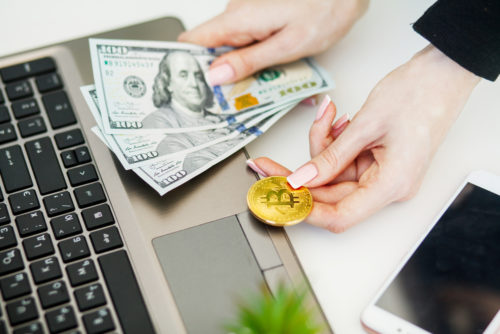Buying Bitcoin or one of the many other types of cryptocurrency out there can be a very rewarding investment, but it comes with an extremely high risk. Investing in cryptocurrency won’t give you overnight returns, but it can be a lucrative endeavor over time.
In recent years, the cryptocurrency market has evolved, but Bitcoin has remained one of the most popular forms of cryptocurrency in the world of investing. Bitcoin was the pioneer in anonymous transacting. People use this decentralized, peer-to-peer virtual currency as money to buy goods and services but it’s not backed by any form of government.
If you’re interested in the world of high-risk, high-reward investments and want to incorporate cryptocurrency into your investment strategy, read on to learn more about buying cryptocurrency and the best strategies when it comes to using cryptocurrency to invest.
Table of Contents
Buying Cryptocurrency With Centralized Exchanges
One of the most common and reliable methods of purchasing cryptocurrency is using a centralized exchange. These are online platforms that simplify buying and selling cryptocurrency. While there are many centralized exchanges you can use to buy and sell cryptocurrency, the three largest centralized exchanges are detailed below.
Coinbase
Coinbase is a centralized exchange that allows buyers and sellers to exchange various forms of cryptocurrency, from Bitcoin to Ethereum to Litecoin. In addition to buying, selling, and using cryptocurrency, Coinbase allows you to store your cryptocurrency.
Coinbase also offers USD Coin (USDC), a type of cryptocurrency that is referred to as a stablecoin. The price of USD Coin is stable, meaning you can redeem one coin for $1. Coinbase rewards their customers with each USD Coin that they hold, enticing customers to use Coinbase for a variety of crypto services. There are no fees for Coinbase’s USD Coin services.
You can also take courses on Coinbase to learn about crypto while being paid in crypto. The prices for each class vary both in value and in cryptocurrency, as do the payments made for each quiz that is completed.
Coinbase has a range of services for corporations, too. From commerce to crypto custody and a platform to raise money for crypto ventures, Coinbase makes it easy for businesses to handle their crypto affairs as well.
In terms of fees, Coinbase charges a “Spread of about one-half of one percent (0.50%) for digital currency purchases and digital currency sales.” This fee can change due to market fluctuations in the price of digital currencies between the time a price is quoted and the time an order is executed. Coinbase also charges a fee in addition to that spread, “Which is the greater of a flat fee or a variable percentage fee determined by region, product feature, and payment type.”
Coinbase’s flat fees are:
- For total transactions less than or equal to $10 — $0.99.
- For total transactions more than $10 but less than or equal to $25 — $1.49.
- For total transactions more than $25 but less than or equal to $50 — $1.99.
- For total transactions more than $50 but less than or equal to $200 — $2.99.
Binance
Binance is another cryptocurrency exchange that allows users to trade Bitcoin, Binance Coin (BNB), and hundreds of other cryptocurrencies. They offer a range of crypto services, including:
- Exchange: Binance allows you to trade from anywhere with ease.
- Academy: You can learn about the world of cryptocurrency, from blockchain to economics and security, free of charge.
- Binance Charity: Collect money for a social impact fund or donate to a number of charities with cryptocurrency. Binance also donates all of their exchange’s token listing fees to the Binance charity fund.
- Labs: Similar to Binance’s Academy, Labs is the venture arm of Binance that was established to incubate, invest, and empower blockchain and cryptocurrency entrepreneurs and communities.
- Launchpad: This is Binance’s token launch platform that helps transformative blockchain startups raise funds to develop products.
- Research: Binance provides relevant and timely insight and resources to anyone interested in the world of cryptocurrency.
- TrustWallet: Binance’s solution to storing, buying, and selling cryptocurrency with ease.
Binance charges different fees for trading, deposits, and withdrawals. For trading, your trading volume over the past 30-day period and your current balance are evaluated, which determines the tier level and fees you are charged.
There is no fee to deposit any type of cryptocurrency, but each comes with their own minimum withdrawal amount and fee. For instance, Bitcoin has a minimum withdrawal of 0.0000038 and a fee of 0.0000019 bitcoin (BTC). Check Binance’s full fee schedule for more information.
Robinhood
Robinhood is a unique centralized exchange in that they offer commission-free trades in stocks, funds, and options. They also offer commission-free buying and selling of cryptocurrencies.
You can invest in over 5,000 stocks on Robinhood Financial, including most U.S. equities and exchange-traded funds (ETFs) listed on U.S. exchanges. Robinhood also offers options trading, cryptocurrency trading, and global stocks not listed on American exchanges, allowing you to keep track of all of your investments in one place.
While Robinhood doesn’t charge fees to open, maintain, or transfer funds to your account, there are fees to trade stock. These are charged to sell orders, regardless of the brokerage:
- U.S. Securities and Exchange Commission (SEC) regulatory fee: “$20.70 per $1,000,000 of principal, rounded up to the nearest penny.”
- FINRA Trading Activity Fee (TAF): “$.000119 per share, rounded up to the nearest penny and no greater than $5.95.”
View Robinhood’s full fee schedule for more information.
As mentioned previously, there are other platforms that allow you to buy and sell cryptocurrency. These are simply the three biggest and most popular, but you may want to explore the other centralized exchanges out there to find the one that’s right for you.
Other Options for Buying Crypto
While the centralized exchanges mentioned above are the most popular ways to buy crypto, there are alternative methods of doing so. Below are some other options for purchasing cryptocurrencies.
Decentralized Exchanges
To understand what a decentralized exchange is, it’s important to know how blockchains work. Blockchains are peer-to-peer (P2P) networks of computers — known as nodes — that run software allowing them to find and communicate with each other. Each node in the network maintains an identical copy of the transaction ledgers by synchronizing with other nodes on a sequence. Depending on the specific blockchain in question, a certain percentage of nodes have to approve a transaction for it to go through.
Decentralized exchanges are growing in popularity. By cutting out the third party and buying, selling, and trading directly with peers, users are able to lower the fees that third parties charge for these exchanges. In addition, decentralized exchanges allow users to feel more secure about their funds and, ultimately, maintain more control over them as well.
P2P Transactions
Decentralized community advertising boards can facilitate peer-to-peer transactions in which users trade cash for cryptocurrency. All you need is a reliable internet connection. Unlike centralized exchanges, decentralized exchanges remove users’ need to give up custody of their cryptocurrency or digital asset to a third party. Instead, trades are conducted on a P2P network through an automated process.
Note that security precautions are a must in P2P transactions, as P2P communities are managed by a network of computers, not a government authority. The currencies used in these transactions, as well as the recording of each transaction, are managed through a network of computers, maintained by the collective.
Distributed ledgers can be a notable security advantage, but it is the responsibility of the peers within the network to accurately and promptly record transactions as they occur. Another risk that comes with a lack of transparency in the world of virtual currencies is that illegal activities, such as money laundering, are easy to facilitate without detection.
Bitcoin ATMs
A Bitcoin ATM allows users to buy Bitcoin with cash or a valid debit card. You can also sell Bitcoin for cash. You can use Bitcoin ATMs to send money to friends and family who have access to a Bitcoin ATM in their area. Coin ATM Radar is a useful resource for finding where Bitcoin ATMs are located in your area.
When you use a Bitcoin ATM, the transaction is anonymous, so you are able to buy and sell cryptocurrency without registering online or using your personal computer. Bitcoin ATMs are not linked to your personal bank account, unlike centralized and decentralized platforms.
Buying Altcoins
Alternative cryptocurrencies, known as altcoins, are anything other than Bitcoin. While the term is broadly used to describe cryptos that are not mainstream, it’s important to note that many altcoins may only be purchased with other cryptocurrencies.
There is an inherent risk of investing in altcoins because they may turn out to be practically worthless in the long run. As with any new cryptocurrency, the creators will look to push their product in order to earn a greater return, but it’s important to research the altcoin you want to purchase before you buy it to ensure it’s legitimate.
You can purchase altcoins on the same exchanges you would use to buy or sell any other type of crypto. Typically, you can only purchase altcoins with more established cryptos, like Bitcoin.
Cryptocurrency Investment Tips
If you’re interested in investing in crypto and want to maximize your potential returns and safeguard yourself from risk as much as possible, you’ll need a solid investment plan. Plenty of research is involved, but the cryptocurrency investment tips below will help you prepare.
Learn the Risks
As with any kind of investment, there are certain risks involved. The risks associated with crypto investments are unique, so it’s important to familiarize yourself with them before deciding to invest.
- Peruse their whitepaper: This will detail how the crypto will be used, the technical specs, the economic value of the crypto, and other important features.
- Look into the team behind the crypto: Do they have relevant experience? Who are their developers? Do they have a transparent operation? The answer to these questions will help you form a more educated decision. Similarly, you should look into the team of advisors, investors, and partnerships involved with the crypto.
- Research the economics of the crypto: Many projects don’t have an actual use for their token. To ensure that the one you want to invest in does, consult their whitepaper for information on token distribution and their vesting schedule.
- Investigate competitors: The world of crypto is incredibly competitive, so it’s important to investigate the competition to see if the crypto you want to invest in has any legs to stand on.
- Portfolio diversification is a must: As with any investment strategy, it’s important to diversify your portfolio. In the event that the crypto you invest in is a bust, you’ll be better equipped to withstand the damage.
Avoid Being an Emotional Trader
Cryptocurrencies of all kinds are extremely volatile, meaning they can increase and decrease in value at a moment’s notice. When buying, selling, and trading cryptocurrency, do your best to keep your emotions out of it. Impulsively buying or selling based on a gut feeling of fear or greed often leads to poor trades.
To prevent making emotional trades and putting yourself at the risk of losing funds, have a strategy in mind, conduct research, and use trusted tools when dealing with all of your crypto buying, selling, and trading.
Understand Crypto Taxation
Cryptocurrency is not managed by the government, which means taxes are not regulated. However, that doesn’t mean you don’t have to pay taxes.
While many crypto traders choose not to claim earnings from crypto trading, doing so is illegal. The IRS treats virtual currency as property and taxes earnings from cryptocurrency as such. They are continuing to look into methods for tracking crypto transactions, and the consequences for failing to report such earnings can be dire.
Before you get started in the world of buying, selling, and trading cryptocurrency, familiarize yourself with the best practices. Through careful research and strategic investments, you may be able to earn a substantial amount from the world of crypto.
Image Source: https://depositphotos.com/





